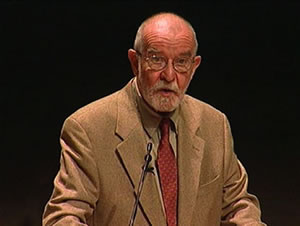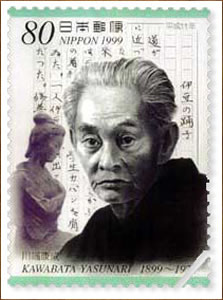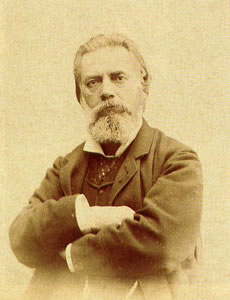De Zuidafrikaanse schrijver Harold Athol Lannigan Fugard werd geboren op 11 juni 1932 in Middelburg, Kaapprovincie. Zie ook mijn blog van 11 juni 2007 en ook mijn blog van 11 juni 2008 en ook mijn blog van 11 juni 2009.
Uit: Tsotsi
„Tsotsi opened his eyes and listened to the knocking on his door.
Instinctively, but for no other reason than having awoken, he put his hand under his pillow to find his knife.
Before he found it, another thought crossed his mind and he sat up on his elbows and looked down at the foot of the bed. The baby was still there, and apparently asleep.
The knocking had stopped, but now came again. Tsotsi shook his head.
He must have fallen asleep; some time in the night his tiredness must have caught up with him and he had fallen asleep.
No, it was in the morning. He remembered going out once to piss and hearing cocks crowing and noticing that the sky was pale.
How long had he slept? He looked at the window and listened. Bright light and casual noise. Early morning.“

Athol Fugard (Middelburg (ZA), 11 juni 1932)
De Japanse schrijver Yasunari Kawabata werd geboren op 11 juni 1899 in Osaka. Zie ook mijn blog van 11 juni 2007 en ook mijn blog van 11 juni 2009.
Uit: The dancing girl of Izu and other stories (Vertaald door J. Martin Holman)
“Since I was a boy, I have had neither my own house nor home. During school vacations I stayed with relatives. I made the rounds of my many relatives from one house to another. However, I spent most of my school vacations at the homes of two of my closest relatives. The
se two houses were south and north of the Yodo River, one in a town in Kawachi Province and the other in a mountain village in Settsu Province. I traveled back and forth by ferry. At either house I was greeted not with “Thank you for coming” but with “Welcome home.”
During the summer holiday when I was twenty-two, I attended three funerals in the space of less than a month. Each time, I wore my late father’s silk gauze jacket, long divided skirts, and white socks, and I carried a Buddhist rosary. </p> <p> First there was a funeral in a branch of the Kawachi household. The mother of the family’s patriarch had died. She was quite old; they said she had grandchildren in their thirties and that she had been nursed through a long illness. You might say she had gone on to her reward without regrets. When I gazed at the patriarch’s despondent appearance and the granddaughters’ red eyes, I could see their grief. But my heart did not mourn directly for the late woman; I could not grieve her death. Although I burned incense before the altar, I did not know the face of the woman in the coffin. I had forgotten there even was such a person. </p> <p> Before the coffin was carried out, I made a condolence call in mourning clothes, rosary and fan in hand, with my elder cousin who had come from Settsu. Compared to my cousin’s behavior, what little I did, though I was young, appeared considerably more composed and appropriate for a funeral ceremony. I was comfortable performing my role. Surprised, my cousin studied my bearing and imitated me. Five or six cousins were gathered in the main house. They felt no need to make solemn faces. </p> <p> About a week later, I was in Kawachi when I received a telephone call from my elder cousin in Settsu. There was going to be a funeral in a branch of the family into which his elder sister had married.”

Yasunari Kawabata (11 juni 1899 — 16 april 1972)
De Franse schrijver Jules Vallès werd geboren op 11 juni 1832 in Puy-en-Velay, Haute-Loire. Zie ook mijn blog van 11 juni 2009.
Uit: Les Enfants du Peuple
“Nous parlerons de la prison et point du prisonnier, non d’un coupable, mais d’un supplice. Je connais Mazas. Il y a de cela pas mal d’années, nous fûmes, quelques amis et moi, arrêtés. Ce n’était la faute de personne. Un pauvre garçon nous avait dénoncés comme complices de je ne sais quelle conspiration, et l’on nous conduisit en prison. Renseignements pris, le juge d’instruction reconnut que notre accusateur n’était qu’un fou. Depuis le collège où nous avions été ses camarades et où nous nous mettions quelquefois à dix pour le maintenir dans ses accès, il était en proie à des attaques d’épilepsie et de délire ; lui-même avoua sa folie : on nous relâcha. Mais nous avions passé là quelques semaines, et entendant parler ces jours-ci prison et prisonnier, il m’est revenu à la mémoire quelques-unes des sensations que j’éprouvai dans la cellule et entre les murs des promenoirs…”

Jules Vallès (11 juni 1832 – 14 februari 1885)
De Engelse dichter en satiricus George Wither werd geboren op 11 juni 1588 in Bentworth. Zie ook mijn blog van 11 juni 2007 en ook mijn blog van 11 juni 2009.
A Sonnet Upon a Stolen Kiss
Now gentle sleep hath clos’d up those eyes
Which waking kept my boldest thoughts in awe,
And free access unto that sweet lip lies,
From whence I long the rosy breath to draw;
Methinks no wrong it were if I should steal
From those two melting rubies one poor kiss;
None sees the theft that would the thief reveal,
Nor rob I her of aught which she can miss;
Nay, should I twenty kisses take away,
There would be little sign I had done so;
Why then should I this robbery delay?
Oh! she may wake and therewith angry grow.
Well, if she do, I’ll back restore that one,
And twenty hundred thousand more for loan.

George Wither (11 juni 1588 – 2 mei 1667)
De Engelse dichter en vertaler Barnabe Googe werd geboren op 11 juni 1540 in Londen of Kent. Zie ook mijn blog van 11 juni 2009.
Out Of Sight, Out Of Mind
The oftener seen, the more I lust,
The more I lust, the more I smart,
The more I smart, the more I trust,
The more I trust, the heavier heart;
The heavy hearty breeds mine unrest,
Thy absence, therefore, like I best.
The rarer seen, the lest in mind,
The less in mind, the lesser pain,
The lesser pain, less grief I find,
The lesser grief, the greater gain,
The greater gain, the merrier I,
The further off, the more I joy,
The more I joy, the happier life,
The happier life, less hurts annoy,
The lesser hurts, pleasure most rife:
Such pleasures rife shall I obtain
When distance doth depart us twain.

Staple’s Inn, het oudste gebouw in Londen, geschilderd door Eric Bottomley
(Geen portret beschikbaar)
